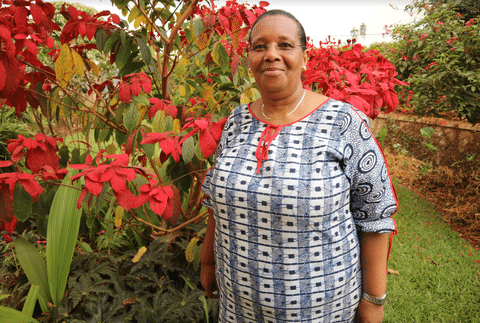KIGALI, Rwanda – Marie shuffled seven chairs to fit around the table in her courtyard, placed down a tray of tea, and poured water into glasses. When her friends arrived, she hugged each of them.
“If they won’t let us in,” Marie paused, “We’ll have to find another way.”
“They” were the Burundi government, and the women were members of a 300-strong, women-only advocacy group, ‘Women and Girls Movement for Peace and Security in Burundi.’
Led by Marie Louise Baricako, a 64-year-old Burundian activist, the group hopes to help stop the bloodshed in Burundi, a country teetering on the edge of genocide. President Pierre Nkurunziza has led a campaign of intimidation and violence on citizens who oppose his contested presidency, driving masses of citizens into exile. Marie’s group aims to find a way for women to be both seen and heard by the Burundi government, the African Union, and the United Nations Security Council, and to call for women’s inclusion in the political negotiations and peace talks.
“You cannot have peace if you don’t listen to women,” Marie said. That afternoon, the group discussed ways to be involved in the country’s ‘peace talk’ held in Tanzania in mid-February, a talk in which 31 men were invited, but only two women. “Women must be involved in these conversations the leaders are having. We cannot influence something from the outside.”
Nearly 400,000 Burundians have fled the country since 2015. The U.N. says torture and sexual violence against women is on the rise; one report described women as “running from rape,” committed by “Imbonerakure,” the government youth league. Women have also been brutally beaten and gang-raped by men armed with guns, sticks, or knives, according to Human Rights Watch.
The peace talks are essential to creating stability and calm in the country.
But women’s involvement in the talks appear to be a threat to the Burundi government and their international allies. Earlier this month, a member of the movement was barred from giving a briefing to the U.N. Security Council about the atrocities committed in Burundi after Russia objected to her participation.
“No one dares tell him the truth,” Marie said, referring to the Burundian president. “He tells the rest of the world everything is fine and under control – and it’s a lie.”
Marie’s position as a leader for the group fell into her lap. After several years in political advocacy across multiple countries in Africa and following a stint with the United Nations, she returned home to Burundi at the beginning of the crisis in 2015. Marie says that when President Nkurunziza announced his third term, it not only sparked the country’s turmoil, but also marked a women’s uprising.
“I came back home and found the movement had already begun,” she said, gesturing to the women sitting around the table. “Women were saying about me, ‘our coach is back! Take your position.’ There was no discussion: they were waiting for me, and I got to work.”

Marie and her group want to help amplify the voices of those who have survived sexual violence, and they face an uphill challenge.
“I know one woman, who is slightly younger than me,” Marie said. “She was taken by police and was raped by five people. But she cannot talk about it, or complain, she doesn’t dare – she’s scared, for herself, her family, her reputation, for everything. These are the kinds of things happening every day in Burundi.”
Though women’s involvement in conflict resolution has proven to be beneficial – especially in bringing underserved, gender-specific issues to the table – their involvement often remains contested, or denied, by governments and international agencies. In a sample of 31 major peace processes between 1992 and 2001, only 4 percent of signatories were women.
Marie’s group has trained hundreds of Burundian women as campaigners in gender issues and conflict resolution, and they’ve organized regional meetings to discuss issues such as disarmament, radicalized groups, and conditions for refugees. Many members have met with U.N. and E.U. officials to discuss tougher, targeted sanctions. The group say their only opposition is Nkukrunziza and his supporters, and that their work will not be complete until they gain equal participation for women into his peace talks.
Marie remains hopeful for the movement’s future. Last week, she and other members met with women’s groups in the East African Community countries to host their own talks. While there, the women set up an advocacy group for the region, with the current focus being on Burundi and South Sudan. They plan to continue with cross-country collaborative efforts in working towards peace resolution.
“Simply put,” Marie said as the women scribbled into their notebooks, “we cannot stand by and wait while our sisters are being raped, and while our children are being killed and brutalised, and being used to kill and brutalize their own brothers. When we talk about peace, we’re not talking about something that only lasts a few years before it falls apart again – we need to make it last so we can save Burundi.”
Read the original article here.


Leave A Comment
You must be logged in to post a comment.